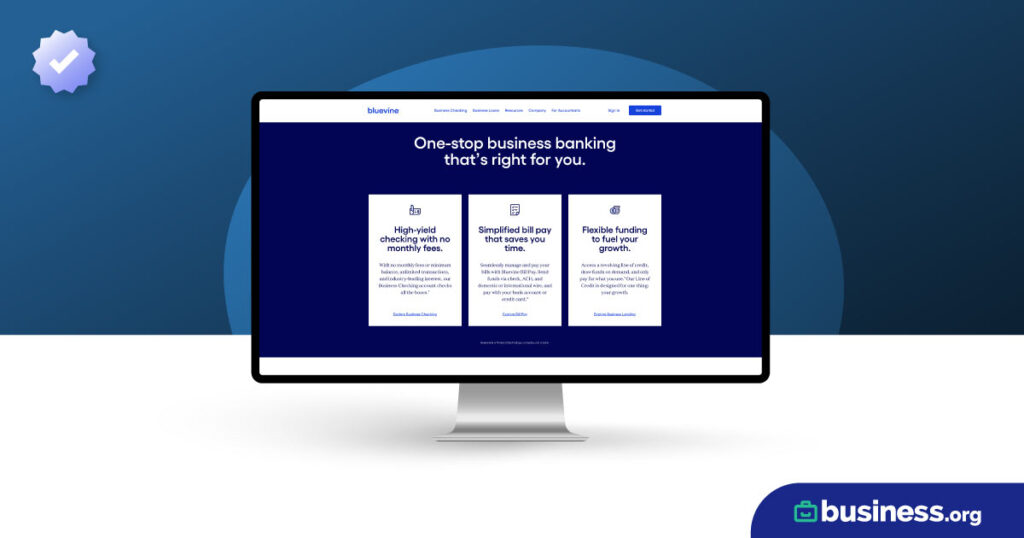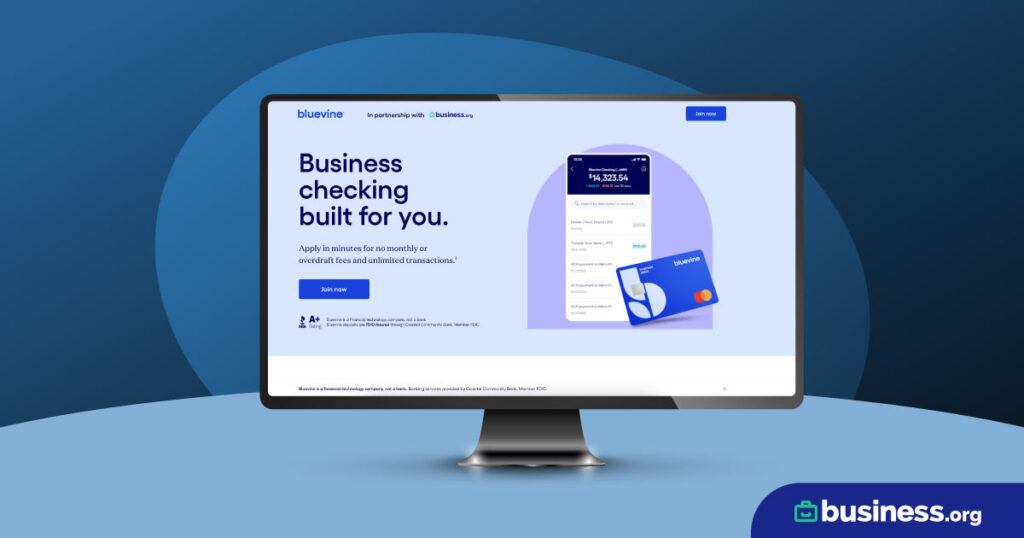We are committed to sharing unbiased reviews. Some of the links on our site are from our partners who compensate us. Read our editorial guidelines and advertising disclosure.
Capital One Business Banking Review 2023
Data as of 12/20/22. Offers and availability may vary by location and are subject to change.
Considering a Capital One business account?
The bottom line: This large traditional bank has lower-than-average banking fees on business accounts (and no transaction fees at all). And aside from simple business checking accounts and savings accounts, Capital One offers products like loans, top-notch credit cards, and more.
But Capital One has its downsides. Negative customer reviews, limited availability, and in-branch applications keep us from rating Capital One better. So while Capital One may work for your small business, it’s not one of our top picks for business banking.
Learn more about all that―and everything else you need to know about Capital One for business―in this Capital One banking review.
Capital One plans and pricing
Capital One has both checking accounts and savings accounts for businesses (along with personal bank accounts). But unlike some other traditional banks, Capital One keeps things pretty simple with just a handful of options.
We’ll break those options down for you. Just keep in mind that you can’t apply for Capital One bank accounts online. (Yeah, it annoys us too.) To open a business bank account with Capital One, you have to visit your local branch.
Capital One checking accounts
Capital One offers two kinds of business checking accounts: Basic Checking and Unlimited Checking.
Compare Capital One business checking accounts
Data as of 12/20/22. Offers and availability may vary by location and are subject to change.
As you can tell from the name, the Basic Checking account gives you just the essentials―no frills. It has a lower monthly fee, which you waive with just a $2,000 30- or 90- day average balance. (Not bad.)
You don’t have to pay any transaction fees with Basic Checking, and you won’t have to pay cash deposit fees on your first $5,000 in cash deposits. After that, you’ll have a $1 per $1,000 fee. And if you need to send or receive a wire transfer, expect a domestic wire transfer fee of $15 for incoming wires and $25 for outgoing.
If you do more than very basic business banking, you might prefer Unlimited Checking. This account has a higher monthly fee (waivable with a $25,000 average account balance), but you pay less in other fees. You still don’t have transaction fees, but you also don’t have cash deposit fees or incoming wire transfers fees. Plus, you get five free outgoing domestic wires each month. Unlimited Checking also gives you two complimentary Basic Checking accounts.
Take note, though: Capital One expects Unlimited Checking customers to make less than $40,000 in cash deposits per month. Go over that, and you’ll need to switch to a commercial bank account.
While Capital One only offers details about Basic Checking and Unlimited Checking, it can help you with other kinds of business checking accounts:
- Custom checking
- Escrow accounts
- IOLTAs
But you have to talk with a Capital One banker to get any more information on those account options.
Capital One savings accounts
As for savings, Capital One has just one business savings account. Luckily, we like it more than most savings accounts from traditional banks.
Capital One business savings account pricing
Data as of 12/20/22. Offers and availability may vary by location and are subject to change.
Capital One business savings comes with a very low monthly fee of just $3―and as long as you keep even $300 in your savings account, you won’t even have to pay that $3. Put simply, this is a very affordable account.
It also earns more than savings accounts from most traditional banks―or at least it can. Capital One locks in your interest rate for your first year. Right now, you get 0.2% interest for 12 months.
That’s a much higher rate than we see from many banks, which often offers rates closer to 0.02%. That said, Capital One doesn’t publish its standard rates, so we can’t tell you what to expect after that promotional period. And while Capital One’s promo rate beats rates from other traditional banks, you can find much better interest rates from online banks.
(Our rankings of the best high-yield savings accounts for small businesses will point you in the right direction.)
It’s also worth noting that Capital One does also have business certificates of deposit (CDs) available. But once more, you’ll have to chat with your business bank to get any details.
Capital One features
Now that you’ve seen Capital One’s business bank accounts, let’s chat about what we think you’ll like about this bank.
For starters, Capital One has one of the benefits you get from many traditional banks: It has plenty of different financial products for your business.
From checking accounts to savings accounts to business loans to merchant services to business credit cards, Capital One can do a lot for your business. (We’ll talk more about those other products later in this review.) That can be more convenient than spreading financial accounts across many providers.
But Capital One has more affordable business bank accounts than many other traditional banks. It doesn’t charge transaction fees, for instance, and it gives you lots of free cash deposits. Plus, Capital One doesn’t make you keep a very high account balance to waive its monthly maintenance fees.
In other words, Capital One offers more value for the price than lots of traditional banks do.
And while we’re on the topic of other banks, let’s look at how Capital One compares to competitor banks.
By signing up I agree to the Terms of Use and Privacy Policy.
Compare Capital One vs. competitors
Data as of 12/20/22. Offers and availability may vary by location and are subject to change.
Like we said, we think Capital One looks pretty good compared to other traditional banks. It offers more affordable business banking with lower (and fewer) fees than other banks.
However, other traditional banks offer more bank account options than Capital One. So if neither of Capital One’s business checking accounts seem like quite the right fit, you may want to check out other traditional banks like Bank of America or TD Bank.
But what about online business bank accounts? Online banks like Bluevine and Small Business Bank cost even less than Capital One. In fact, these banks generally have no monthly service fees. And as we mentioned earlier, they also have perks like higher interest rates on your bank account.
Online banks offer even fewer account choices than Capital One, though. Plus, most of them don’t have things like credit cards and merchant services.
But before you decide if Capital One is the bank for you, we have some more factors you may want to consider.
Capital One drawbacks
While we do think Capital One offers affordable business banking, it has some problems you need to know about. These might even be dealbreakers for you.
Account applications
First off, we dislike that Capital One makes you apply for bank accounts in a branch. Who has the time to drive to a branch, wait for a banker, and fill out paperwork on-site? Especially during business hours?
In-person applications were already annoying in 2020 and 2021, but they’re pretty inexcusable in 2023 when businesses all around the world have figured out how to do almost everything online.
We wish Capital One would respect your valuable time as a business owner and offer online account applications.
Limited availability
Another potential problem? Capital One doesn’t have a very wide service area.
In fact, Capital One only has branches in Louisiana, Maryland, New Jersey, New York, Texas, Virginia, and Washington, D.C.
Hopefully that works for your business. But if you don’t live in one of those states, you’ll need to find the best bank for small business in your state instead.
Customer reviews
And now we come to our biggest concern about Capital One: the really bad customer reviews.
On the one hand, pretty much all traditional banks get bad reviews. Capital One’s 1.3 on Trupilot and 1.13 on its Better Business Bureau profile (both out of 5) don’t stand out that much.1, 2 But it only gets a 2.8 (out of 5) on Bank Branch Locator―a lower score than most banks we review.3
So why the bad reviews? Well, in fairness, a lot of the negative reviews have to do with Capital One credit cards. Users complain that Capital One took too long sending initial or replacement credit cards, that it doesn’t offer robust fraud protection, and that Capital One keeps mistakenly blocking cards.
We also saw quite a few reviews complaining about bad customer service, including long hold times and unhelpful customer support reps.
The most surprising trend, though, came from reviews on Bank Branch Locator. There we saw quite a few complaints about Capital One closing branches. And sure enough, a little digging showed us that Capital One has closed half of its branches in the last 10 years―more than three dozen in 2020 alone.4, 5
In other words, don’t expect your local Capital One branch to stick around. If that’s a problem (and remember, you have to visit a branch to open a business bank account), you might want to go with another bank instead.
Capital One additional features and considerations
Not concerned about the issues with Capital One? Then we think you’ll be pleased to hear that Capital One has some more products that can help your business.
Business financing
Like most traditional banks, Capital One offers a variety of business loans and other kinds of business financing:
- Business installment loans
- Equipment loans
- Investor real estate loans
- Lines of credit (revolving and non-revolving)
- Real estate term loans
- Vehicle loans
- SBA 504 loans
- SBA 7(a) loans
Capital One’s website doesn’t list interest rates or loan terms, but the site does say that several types of loans go up to $5 million.
Capital One expects your business to have been around for at least two years when you apply for a business loan. It doesn’t list credit score or revenue requirements, but if it’s anything like other banks, you’ll need a good credit score and more than $200,000 in revenue to qualify.
Business credit cards
Capital One also offers a number of different business credit cards.
It has six business credit card options, all of which come with virtual card numbers (which lessens your risk of fraud) and free cards for employees. The cards also all have rewards programs, with flat-rate rewards.
Most Capital One business credit cards offer cash back:
- Spark 2% Cash Plus
- Spark 1.5% Cash Select (with introductory bonus)
- Spark 1.5% Cash Select (with intro APR)
- Spark 1% Classic
Capital One also has a couple a travel card options:
- Spark 2X Miles
- Spark 1.5X Miles Select
Only the Spark 2% Cash Plus and Spark 2X Miles have an annual fee, and Spark 2X miles waives your fee the first year. Most of the cards come with either a promotional APR period or an earning bonus for new customers.
You’ll find several Capital One credit cards on our list of the best small-business credit cards.
Misc.
And finally, Capital One offers these miscellaneous products and services:
- Merchant services
- Escrow Express sub-accounting platform
- Trade credit
- Commercial banking and lending
The takeaway
We see why some small-business owners would like Capital One. It has competitive banking fees―and no transaction fees on its business checking accounts. Plus, Capital One has more than just bank accounts. It can also offer your business loans, (very competitive) credit cards, merchant services, and more.
But Capital One has the same problems as most traditional banks: limited availability and poor customer reviews. Plus, Capital One requires in-person applications for bank accounts―which is even more problematic when you remember that Capital One keeps closing branches.
Simply put, Capital One isn’t our favorite bank for businesses―it’s not even our favorite traditional bank―but it may work well for some business owners.
Not ready to commit to Capital One? See our favorite alternatives on our list of the best banks for small business.
Capital One FAQ
Yes, Capital One is a real bank. It’s been around since 1994, and it’s one of the 10 largest banks in the United States.6
Capital One can be a good bank, depending on your business’s banking needs. If you prefer a traditional bank, then Capital One has affordable accounts and plenty of other financial services for your business.
Yes, it’s safe to bank with Capital One. Like most banks, Capital One accounts come insured by the FDIC for up to $250,000.
Disclaimer
At Business.org, our research is meant to offer general product and service recommendations. We don't guarantee that our suggestions will work best for each individual or business, so consider your unique needs when choosing products and services.
Sources
1. Trustpilot, “Capital One.” Accessed December 20, 2022.
2. Better Business Bureau, “Capital One Financial Corporation.” Accessed December 20, 2022.
3. Bank Branch Locator, “Capital One.” Accessed December 20, 2022.
4. American Banker, “Capital One Keeps Closing Branches, Even as Rivals Open Them.” July 1, 2019. Accessed December 20, 2022.
5. Fintech Futures, “Capital One Announces US Branch Closures.” March 3, 2020. Accessed December 20, 2022.
6. Bankrate, “The 15 Largest Banks in the US.” May 5, 2022. Accessed December 20, 2022.






